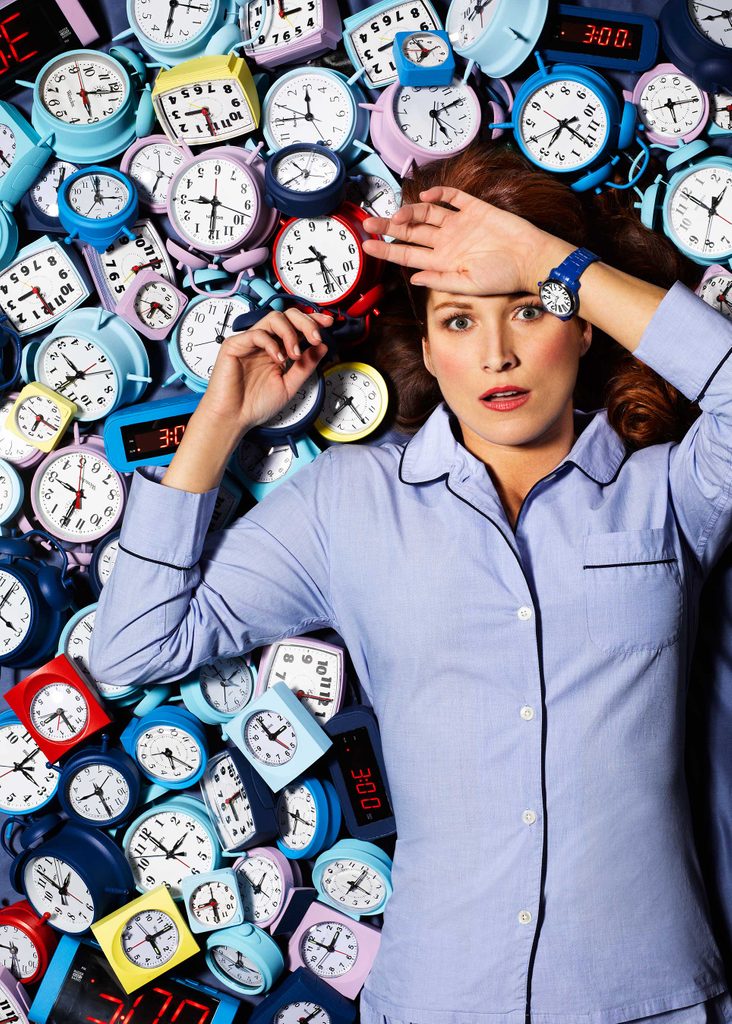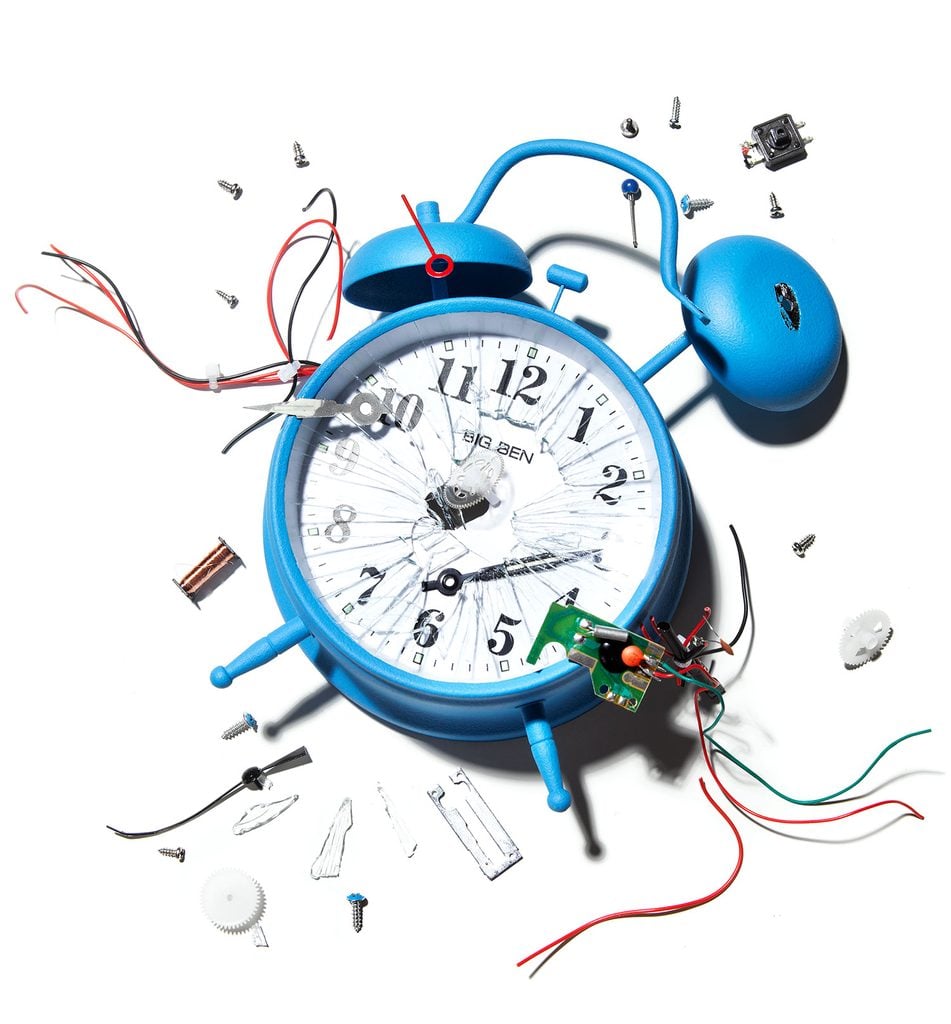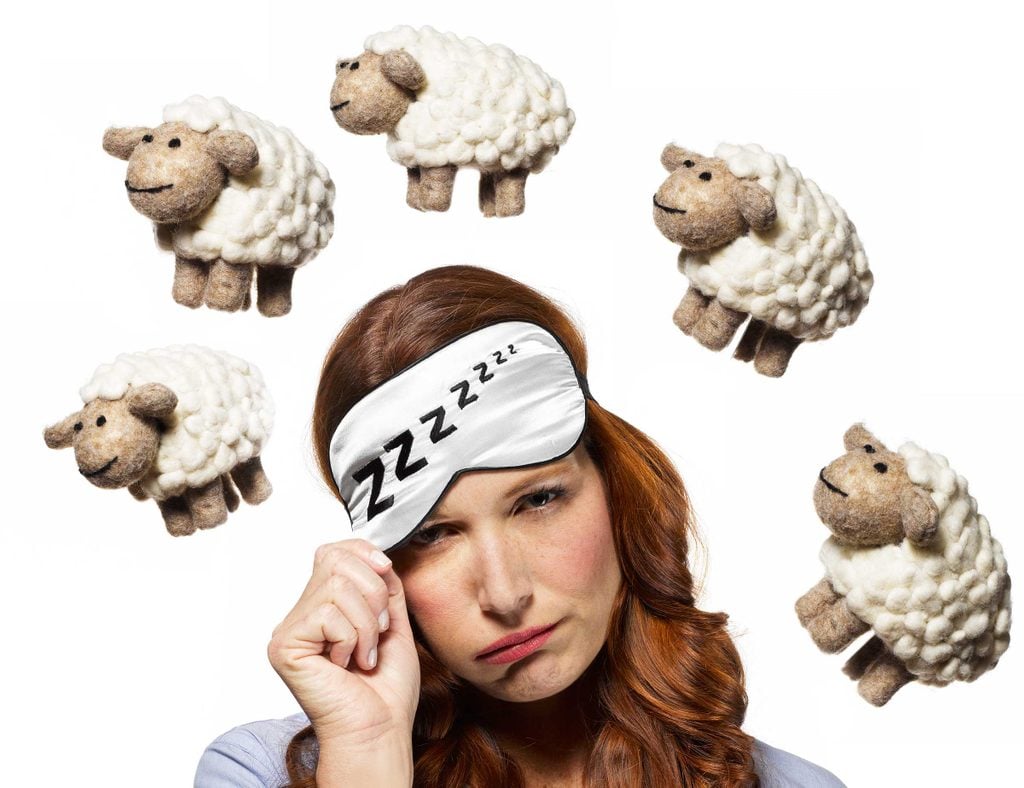America’s Sleep Crisis Is Making Us Sick, Fat, and Stupid. But There’s Hope.
Updated: Aug. 20, 2019
Sleep deprivation now rivals obesity and smoking as our greatest public health crisis. Here's what everyone (including America's businesses) needs to do to help stop our massive sleep debt and get more shuteye.
[dropcap]I[/dropcap]t was just before dawn on a Saturday morning, and most of the 32 passengers on a tour bus traveling from a Connecticut casino to New York City were fast asleep. Suddenly, the riders were jolted awake as the bus struck the right-hand guardrail at 64 mph, almost 15 mph over the speed limit. The vehicle flipped on its side and skidded more than the length of two football fields before hitting a signpost that sheared off the top half of the bus like a tin can. Fifteen people on board died. The others were injured, many seriously.
The driver claimed he’d been clipped by a passing tractor trailer, but a National Transportation Safety Board (NTSB) investigation found that he’d fallen asleep at the wheel. “It was a fatigue accident,” says Mark R. Rosekind, PhD, a sleep expert and an NTSB member. The NTSB found that the driver hadn’t slept for more than three hours in a row in the 72 hours preceding the crash.
Traffic accidents related to fatigue are disturbingly common. They tend to make headlines either when the fatalities are very high—as with the March 2011 accident described above—or when there is a celebrity involved, as with the accident that injured comedian Tracy Morgan last June. The truck driver involved in Morgan’s accident is being charged with vehicular homicide, and the prosecutor alleges that the driver was awake for more than 24 hours preceding the crash. (The driver, who has pleaded not guilty, denies that he was sleep-deprived.) The NTSB estimates that fatigue contributes to as many as a quarter of all transportation accidents—whether car, bus, truck, train, or plane.
Read: 8 Surprising Things You Shouldn’t Do While Tired
That statistic sounds shocking, but experts have known the truth for years: The nation is in the midst of a sleep crisis. In fact, in 2011, the Centers for Disease Control and Prevention (CDC) declared insufficient sleep a public health epidemic—a warning on par with those released about tobacco decades ago. “Sleep-deprived is the new normal, like smoking was in the 1950s,” says Russell Sanna, PhD, former executive director of the Division of Sleep Medicine at Harvard Medical School. Fifty years ago, even doctors smoked, and it took the surgeon general and an enormous public health campaign to convince people that the habit could be deadly.
Sleep Deficits—They Hurt In Surprising Ways
[dropcap]A[/dropcap]ccording to the National Sleep Foundation, everyone, with few exceptions, needs seven to nine hours of sleep a night in order for the body and mind to function optimally. But a CDC survey found that more than a third of adults reported less than seven hours of sleep during a typical 24-hour period. Other experts believe the numbers are even more alarming. “Some of the latest polls show that nearly three quarters of the adult population is not getting the recommended amount of sleep,” says James Maas, PhD, former chair of the psychology department at Cornell University and author of Sleep for Success.
Transportation is the most obvious area where sleepiness exacts a terrible toll—the National Department of Transportation estimates that drowsy driving is responsible for 1,550 fatalities and 40,000 nonfatal injuries every year in the United States—but it’s hardly the only one. Every aspect of our lives is affected by our sleep, from our health to our relationships to our work performance. Sanna puts it bluntly: “Lack of sleep makes us sick, fat, and stupid.”
Sick … because insufficient sleep has been linked to hypertension, diabetes, depression, and early death. Last year, researchers from the University of Chicago published a report showing that poor-quality sleep can speed the growth of cancer and hamper the immune system’s ability to fight off abnormal cells in mice.
Fat … because lack of sleep causes metabolic changes that can lead to weight gain plus hormonal changes that can increase hunger and cognitive changes that can make it difficult to resist that slice of cake. In 2012, researchers at the University of Colorado found that losing just a few hours of sleep for a few nights in a row can lead to extra pounds.
Stupid … because not getting enough sleep affects memory, concentration, reaction time, judgment, and decision making. Last March, University of Pennsylvania researchers found that just three consecutive nights of four to five hours of sleep could lead to irreversible brain cell damage. The study was done with mice, but researchers believe the results may apply to humans too.
Read: The Fascinating Link Between Sleep and Alzheimer’s
Recent research at the University of Rochester shows that during sleep, the brain appears to conduct physiological maintenance, clearing itself of the junk that accumulates in cells during the day as a by-product of thinking. When someone doesn’t get the optimal amount of sleep, the system backs up, and the chemical waste accumulates. The resulting garbage pileup may be why insufficient sleep has also been linked to an increased risk of Alzheimer’s and other types of dementia.
Danger: Sleepy Doctors
[dropcap]F[/dropcap]lavio Casoy, MD, remembers a particularly frightening moment during his medical internship. As he recounted to the Washington Post, he’d been on duty at a San Francisco hospital for nearly 29 hours. He was at the bedside of a very sick patient when the man’s oxygen level began to plummet. Dr. Casoy simply stared at the monitor, transfixed. “I knew something was wrong, but I couldn’t make myself think,” he recalled. Only after another doctor entered the room and said, “Get going,” did the exhausted doctor spring into action.
Dr. Casoy’s case may be an extreme example of the dangers of sleep deprivation, but risks are all around us. “Sleep is private behavior that has public consequences,” says Sanna. It may not be a tragedy if the supermarket checkout clerk yawns and takes a few seconds longer to ring up your groceries. But what if your surgeon, your pilot, your child’s school bus driver, is tired? What about the technician reading your biopsy? What about the factory worker assembling your lawn mower or your car?
A 2003 study done at Henry Ford Hospital showed that losing two hours of sleep in one night—for instance, sleeping six hours instead of eight—had an effect on performance equivalent to drinking two to three beers. “Our entire nation has the potential for impaired performance,” says Rosekind. And a sleep-deprived workforce has a profoundly negative effect on the economy.
It may not be a tragedy if the supermarket checkout clerk yawns and takes a few seconds longer to ring up your groceries. But what if your surgeon, your pilot, your child’s school bus driver, is tired?
If lack of sleep makes individuals sick, fat, and stupid, it makes the workforce less productive, less safe, and more expensive (because of lost productivity, accidents, and increased insurance premiums and health-care costs). And while you should do your part to sleep more, you’ll need help from the rest of society to really effect change.
Read: 7 Eating Habits to Steal From People Who Never Feel Tired
The first challenge is getting companies to recognize sleep debt as a liability at a time when hard work is often synonymous with sending e-mails at 2 a.m. or volunteering for a night shift. “In our world, sleep has been seen as the enemy of capitalism,” says Sanna. “If you’re not working, you’re not generating income.” But sleep experts say that that attitude is simply wrong. “Any work you do after 16 hours of being awake is a recipe for mistakes and accidents,” says Maas.
We may think we’re getting away with shaving small amounts of sleep off the recommended hours each night, but research shows otherwise. A study of how workers function the day after daylight saving time, when they’ve lost an average of 40 minutes of sleep because of the time change, had surprising results. “That amount of lost sleep was tied to a spike in workplace injuries,” says Christopher Barnes, PhD, assistant professor of management at the University of Washington and an expert on workplace sleep and fatigue.
Social scientists have found that a phenomenon called presenteeism, in which workers show up for their jobs but are incapable of doing productive work, costs the U.S. economy over $63 billion in lost productivity. One technological subset of presenteeism has been dubbed cyberloafing, when in many cases sleep-deprived office workers, unable to concentrate, surf the Web or check their personal e-mail during work hours. “You go to YouTube and look at videos of cute kittens playing in paper bags,” says Barnes, whose research found a direct correlation between lack of sleep and logging of time on entertainment websites.
Barnes’s research also found that sleep deprivation leads to unethical decisions, such as cheating or stealing in the workplace. For instance, in one study, students who were deprived of sleep were much more likely to cheat and overreport their performance on a test in order to gain an advantage in a drawing for a cash prize. “In order to behave ethically, we have to be able to resist temptation,” he explains. “When you’re short on sleep, your ability to exert self-control declines, and you might cave in to temptation.” The result of unethical behavior and lowered productivity is inevitably passed on to the rest of us. “There are higher costs for consumers when there are accidents or when defective products go out the door because people aren’t assembling them as they should,” says Maas.
How We Got So Tired
[dropcap]Y[/dropcap]ou could say that Thomas Edison started this epidemic. With the invention of the lightbulb and the possibility of “daylight” anytime, society moved away from its natural dusk-to-dawn sleeping patterns. But until recently, there were still checks in place. “In the days of black-and-white television, a test pattern would come on-screen when the programming was done,” says Sanna. “That was a signal that it was time to disengage and go to sleep. We’ve lost those boundaries between wake and sleep, work and home.”
When there’s not enough time in the day to get everything done, you cheat on your sleep.
The difference between when our natural body clocks want us to sleep and what we have on our social/family/work schedules has been called social jet lag, a widespread phenomenon of people being out of sync with their biorhythms because the demands of their lives intrude. Instead of sleeping and waking with the sun, we stay up way after dark and wake before dawn. Says Maas, “When there’s not enough time in the day to get everything done, you cheat on your sleep.”
Read: Advantages of Being a Morning Person
But social jet lag, unlike the jet lag you suffer when you travel, can be an almost permanent state. “People do more and more things at odd hours,” says David Dinges, PhD, professor of psychiatry and chief of the sleep and chronobiology lab at the University of Pennsylvania School of Medicine. “Our lifestyle is increasingly chronochaotic.”
Today, technology is further eroding our natural biological sleep patterns, says Dinges. “We’ve created a kind of social hypervigilance with technology that interferes with our biological timing. We’re constantly wondering, What e-mail did I just get? What’s on Twitter?” he explains.
The New Era of Sleep
[dropcap]W[/dropcap]hen it became clear that smoking was detrimental to our health, the then surgeon general, Luther L. Terry, issued an urgent report, and in 1965, Congress mandated health warnings on cigarette packs. Five years later, cigarette ads were banned from television and radio. Sleep deprivation doesn’t yet have such a major push behind it, but the CDC, Harvard University, and the American Academy of Sleep Medicine (AASM) are taking steps to sound the alarm.
In November 2013, the CDC and AASM announced the National Healthy Sleep Awareness Project, which will aim to increase the public’s knowledge of sleep health and sleep disorders and to educate health professionals so they can promote healthy sleep too. “Sleep health hasn’t gotten into the general conversation, and that’s what we need to keep hammering,” AASM president M. Safwan Badr, MD, told huffingtonpost.com.
Experts at Harvard Medical School’s Division of Sleep Medicine have been promoting the Sleep Matters Initiative, a partnership with corporations, businesses, and employers to promote a well-rested workforce. The aim, says Sanna, who spearheaded the initiative, is to spread the word that sleep is the third pillar of health, after exercise and nutrition. “But it’s not like exercise and diet, where you might see results a month to two months later,” says Sanna. “If you sleep well one night, you’ll feel it the next morning.”
Even corporations are waking up to the fact that a rested workforce is more productive. Google was seen as a pioneer years ago when it installed nap pods in its headquarters, but more companies now offer tired employees alternatives to cyberloafing. Since 2007, Arianna Huffington, editor-in-chief of huffingtonpost.com, has become a self-proclaimed “sleep evangelist” after she fainted in her office, hit her head on her desk, broke her cheekbone, and required five stitches around her eye. She blamed her accident on lack of sleep. “It got me thinking about what kind of life I was living,” she’s written.
Huffington now tries to get seven or eight hours of sleep a night—she reads an actual book in bed and doesn’t allow electronic devices like phones and readers into the bedroom. She’s tried to promote that message to her employees too. “What I say to people here is, ‘Once you leave the office, unless there’s an emergency, you’re off.’”
Johnson & Johnson, a global behemoth with nearly 130,000 employees worldwide, encourages healthy sleep through comprehensive programs including Web-based digital health coaching and provides energy rooms for relaxation in some of its facilities. “It’s a very holistic approach,” says Fikry Isaac, MD, vice president of global health services for J&J. One message sent to employees from the J&J North American Leadership Team was blunt: “Very simply, do not send e-mails on weekends. If something urgent arises, place a phone call or text.”
Read: 4 Sleep Routine Tweaks That Can Transform Your Health
The most common strategy employers are using to combat workplace fatigue is to offer sleep-hygiene courses, taught by an increasing legion of sleep experts who come at the problem from various disciplines: medicine, psychology, business. Recognizing that getting their employees to sleep more at home will help them perform better at work, top corporations are bringing these experts in to preach the gospel of sleep to their employees. James Maas, for instance, who now works as a sleep lecturer and consultant, has been hired by Goldman Sachs, IBM, Citigroup, Apple, the U.S. Navy, Johnson & Johnson, Pepsi-Cola, and many others.
Eric Severson, senior vice president of global talent solutions for Gap Inc., in San Francisco, used to sleep just six hours a night. He thought it was normal that he occasionally dozed off in meetings. Then Gap’s human resources department brought Maas in to speak at an executive development event, where he talked about how a lack of sleep negatively affects performance.
He used MRI scans to show the difference in brain activity following a good night’s sleep and an inadequate one—the tired brain is dim, while the well-rested one is lit up like a Christmas tree.
Severson was convinced. As he told a publication for HR professionals, “Once I started getting seven hours of sleep, I was significantly more engaged and alert during my workday. Getting adequate sleep makes you more emotionally, physically, mentally, and spiritually resilient,” he said. “It links to everything else.”














